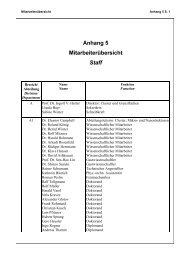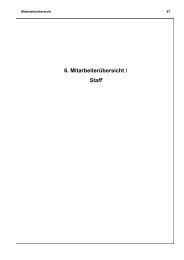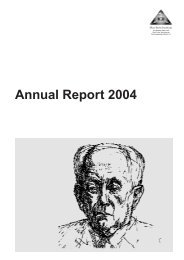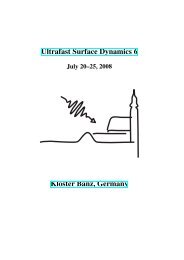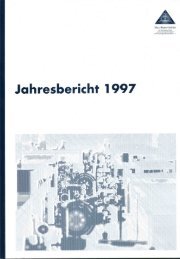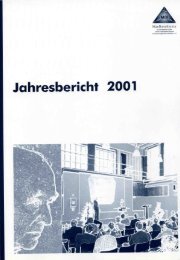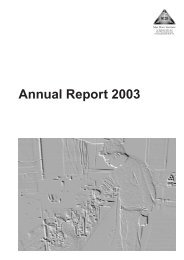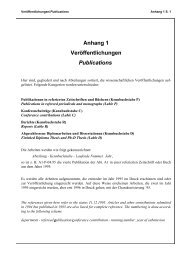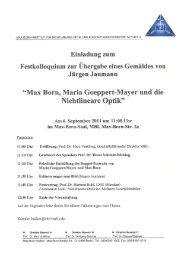Create successful ePaper yourself
Turn your PDF publications into a flip-book with our unique Google optimized e-Paper software.
<strong>Max</strong> <strong>Born</strong>:<br />
A Filial Memoir<br />
I would like to thank the Managing Director of the <strong>Max</strong>-<strong>Born</strong>-<strong>Institut</strong>e for Nonlinear Optics, Professor<br />
Wolfgang Sandner, and his colleagues for inviting me to address this distinguished meeting<br />
in celebration of the award of the Nobel Prize for Physics to my father <strong>Max</strong> <strong>Born</strong> fifty years<br />
ago today, on the 10 th December 1954. Tomorrow, the 11 th December, is the anniversary of his<br />
birth in 1882; he died on the 5 th January 1970. So this occasion evokes many memories of my<br />
remarkable father [1, 2].<br />
One memory is of course of the Nobel Prize occasion. My parents went alone<br />
to Stockholm and came back with good stories and evocative pictures [3, 4,<br />
5, 6]. Those occasions bring together strange bedfellows. The Nobel Prize for<br />
Literature that year went to Ernest Hemingway who, in character, did not turn<br />
up for the Award. I have just read about him in the biography of Martha Gellhorn,<br />
the remarkable war correspondent who was his second wife (Moorehead,<br />
2003) [7]. Two more different characters than Hemingway and <strong>Max</strong> <strong>Born</strong><br />
could hardly be imagined: Hemingway brutal and arrogant; my father gentle<br />
and modest (not to mention their opposite attitudes to women).<br />
The Nobel Prize came at the end of the first year in the little house in Bad Pyrmont<br />
where my parents had retired in 1953 [8]. It was just at the right time<br />
to reinforce his main retirement occupation, which was to educate thinking people in Germany<br />
and elsewhere in the social, economic and political consequences of science [9]. He was, of<br />
course, principally concerned with the implications of nuclear physics for war and peace but<br />
also with other, what he called pathological features of our scientific age such as rocketry and<br />
space travel. With like-minded friends, notably Otto Hahn in Germany [10] and Einstein, Bertrand<br />
Russell and others, <strong>Max</strong> <strong>Born</strong> began to challenge public opinion with the revolutionary<br />
<strong>Max</strong> <strong>Born</strong> • Gustav <strong>Born</strong><br />
Gustav <strong>Born</strong><br />
The William Harvey Research<br />
<strong>Institut</strong>e<br />
Charterhouse Square,<br />
London, EC1M 6BQ,<br />
United Kingdom<br />
Fig. 7<br />
Ernest Hemingway with<br />
his wife Martha Gellhorn.<br />
7



